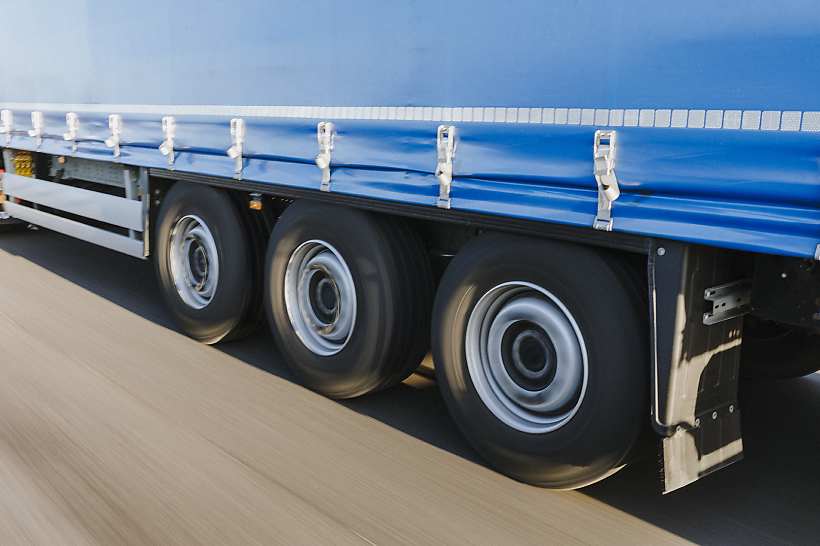Reducing costs is always top of mind when you’re running a fleet. You may find that managing trailers comes with extra efficiency challenges—unless there’s an easy and proactive way for you to monitor and report on your wheeled assets.
We’ve identified four compelling reasons why trailer telematics is essential for fleet optimisation, not to mention safety and sustainability. Eager to explore the value of powering up your trailer management? Read on!
Why should fleets adopt trailer telematics?
1. Trailer telematics is key to improving trailer utilisation
If your fleet has been using asset tracking for some time, you already benefit from having visibility on your trailer locations, which is essential to efficient dispatching. But how do you avoid under-utilised trailers? And how do you know if you’re unnecessarily investing in trailers? To improve trailer utilisation, you need tools that go beyond asset tracking.
Here’s why: kilometre and location data don’t provide enough details to quantify your trailer utilisation. On its own, location and mileage data won’t help you limit empty runs. Nor can it tell you which trailers are connected to vehicles. You want clarity on your fleet’s active capacity. And for that you need additional insights. Advanced trailer telematics will give you a fuller view with data on:
- Empty and loaded status by kilometre travelled and current axle weight
- Coupling status of trailers and vehicles
Richer insights into your trailer utilisation mean sounder investment decisions, since you can calculate the optimal number of trailers for your fleet.
2. With trailer telematics, you can boost safety and security
As a fleet operator, you constantly prioritise the safety and security of your drivers and assets. One critical aspect is adhering to the permissible maximum weight of cargo. By avoiding overloaded trailers and staying within weight limits set for specific motorways, you can ensure your fleet practices road safety. The question is, how can you be sure that your trailers are meeting the right weight requirements?
Digitising your trailer management brings you a wealth of safety data to work with. It enables you to monitor your trailer loads, making it easy to check their compliance with per-country weight restrictions. In ensuring your fleet meets weight limits, you contribute to safety for all road users, since overloaded trailers lead to the degradation of roads, bridges and tunnels.
Plus, there’s always a rollover risk with overloaded trailers. Harsh braking and anti-lock braking events can pose hazards too. With a solution like Webfleet Trailer, you can configure payload limits and receive alerts on overloading, rollover stability, harsh braking and anti-lock braking events.
A trailer management solution offers peace of mind where reducing the risk of theft is concerned. Whether they’re parked for long periods or being transported via rail or waterway, you’re always connected to your trailers and can track your valuable goods.
3. Trailer telematics helps maximise tyre life and tyre safety

Roughly 90% of tyre-related breakdowns are caused by slow leaks. Detecting these leaks is crucial to preventing dangerous blowouts—not to mention unplanned downtime and tyre replacements. A Tyre Pressure Monitoring System (TPMS) gives you visibility into trailer tyre pressure and temperature in real time. In the case of temperature or pressure issues, you’ll get an alert, enabling quick action.
Supply chain issues, the rising cost of raw materials like rubber and inflation have been driving up the price of tyres. Considering that tyres cost around 3% of your operating budget, they’re key to improving overall efficiency. This is where TPMS proves invaluable.
Monitoring tyre conditions is also a matter of compliance. Under its Global Safety Regulation in July 2022, the EU requires new commercial trailers to be equipped with TPMS. As of July 2024, trailers in the aftermarket must also have TPMS installed.
4. Trailer telematics makes it easier to cut fuel costs and emissions
Underinflated tyres contribute to higher fuel consumption. So you may find it surprising that 20% of commercial fleet tyres are sorely underinflated. Research by Bridgestone shows that a 20% dip in a tyre’s inflation pressure can lead to a 2.5% jump in fuel use. Keeping your trailer tyres in good condition can reap huge fuel savings, making digital trailer management a no-brainer.
Higher fuel consumption means higher carbon emissions. Reining in your fleet’s fuel use will have a direct and positive impact on your sustainability benchmarks. Properly inflated tyres are also key to extending tyre life, which helps curtail fleet waste. While the UK doesn’t currently include trailers in legislative initiatives, the EU does. Per rules by the European Commission, large commercial trailers will be factored into CO2 calculations and certifications as of 2024. With or without enacted trailer regulation, reducing carbon emissions is an urgent task for fleets. TPMS can support your environmental responsibility with good tyre health.
In summary
By harnessing trailer telematics, you unlock a wealth of data-driven insights that can bring greater efficiency, safety and sustainability to your fleet. Are you exploring ways to improve your fleet trailer utilisation? Webfleet’s trailer management solution connects to all leading EBS systems. It’s also always connected, meaning you’ll have visibility on your trailers even without rechargeable battery power.
We’re happy to answer questions about trailer management processes. If you could use some guidance, just book a free consultation with us.








